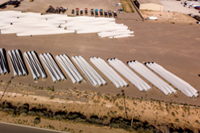Composite engine piston cylinder housings
Phenolic BMC could replace aluminum in car/motorcycle engine housings.
By the year 2020, piston cylinder housings molded from polymer composites will be introduced into passenger car and motorcycle engines, replacing the aluminum components currently in use. That’s the prediction from SBHPP High Performance Plastics, a business unit of Sumitomo Bakelite North America Inc. (Ghent, Belgium, and Tokyo, Japan). Specifically, SBHPP has researched injection molded cylinder housings made with its glass fiber-reinforced phenolic bulk molding compound (BMC), and claims it can deliver the same performance as die-cast aluminum parts along with significant reductions in weight, engine noise and heat radiation.
SBHPP recently cooperated with the Fraunhofer Institute for Chemical Technology ICT (Pfinztal, Germany) to mold a proof-of-concept composite cylinder casing for a single-cylinder 650-cc engine. A 55% glass fiber-reinforced phenolic resin was comolded with integrated inserts and a cylinder liner of aluminum (a heat-conductive liner will be needed with a BMC casing in a liquid-cooled engine, to disperse combustion heat). The part was produced in an optimized injection molding process developed with Fraunhofer, in a part cycle time of 90 seconds.
Thermosensors mounted on the exhaust, drive and inlet sides of the composite part all showed a significantly lower temperature during engine operation than sensors on the reference aluminum housing. Plus, the composite casing was 20% lighter, and acoustic tests confirmed it also greatly reduced engine noise. The project also showed approximately 10% lower manufacturing costs for a production run of up to 30,000 parts per year; for higher production volumes, the estimated cost reduction can be even more significant, claims SBHPP.
Hendrik De Keyser, marketing and technology officer at SBHPP, notes that weight reduction has become a primary focus for auto manufacturers under increasing pressure to improve fuel economy and reduce emissions. He cites lifecycle assessments that show the environmental impact of phenolic composite components over their entire lifetime is lower than that of aluminum alternatives.
SBHPP is marketing the concept to engine suppliers and automotive OEMs and aims, ultimately, to introduce an all-composite engine. “In 3-5 years’ time composite cylinder housings will be a reality,” adds De Keyser.
If you have any questions, please contact Stefan Tröster from Fraunhofer ICT: stefan.troester@ict.fraunhofer.de
Fraunhofer Institute for Chemical Technology ICT
Joseph-von-Fraunhofer Strasse 7
76327 Pfinztal, Germany
Related Content
-
Materials & Processes: Fabrication methods
There are numerous methods for fabricating composite components. Selection of a method for a particular part, therefore, will depend on the materials, the part design and end-use or application. Here's a guide to selection.
-
ASCEND program update: Designing next-gen, high-rate auto and aerospace composites
GKN Aerospace, McLaren Automotive and U.K.-based partners share goals and progress aiming at high-rate, Industry 4.0-enabled, sustainable materials and processes.
-
Plant tour: Joby Aviation, Marina, Calif., U.S.
As the advanced air mobility market begins to take shape, market leader Joby Aviation works to industrialize composites manufacturing for its first-generation, composites-intensive, all-electric air taxi.
















